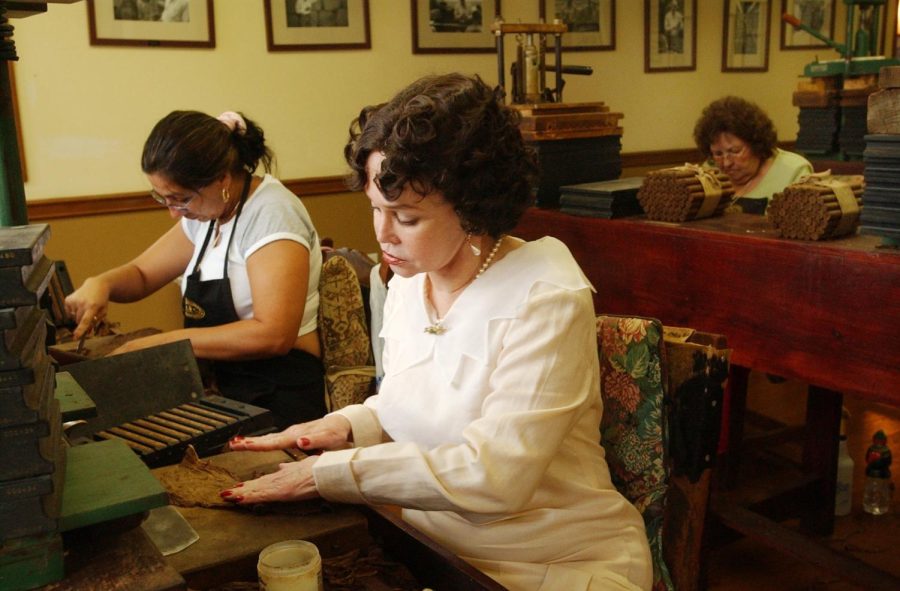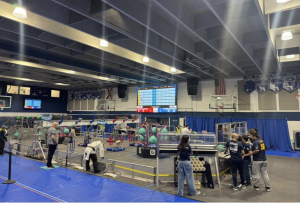Play Review: Anna in the Tropics
KRT ENTERTAINMENT STORY SLUGGED: NILOCRUZ KRT PHOTOGRAPH BY MARICE COHN BAND/MIAMI HERALD (SOUTH FLORIDA SUN-SENTINEL OUT) ( October 5) Teresa Marãa Rojas plays “Ofelia” in “Anna in the Tropics,” directed by Nilo Cruz, at the Coconut Grove Playhouse in Miami, Florida.
January 30, 2023
Last Wednesday,ô IB Juniors took a trip to see Nilo Cruzãs Pulitzer Prize-winning play, Anna in the Tropics, at the Miami New Drama in the Colony Theater.
The play takes place in 1929 Ybor City near Tampa, Florida, in a Cuban-American Cigar factory. The story surrounds the Alcalar immigrant family and their struggles in preserving tradition during the industrial boom. One of the kept traditions in the factory is having a lector read novels and newspapers to the workers, keeping them entertained while they tirelessly hand roll cigars all day.
Upon the arrival of the new lector, Juan Julian Rios, the eldest, married sister of the Alcalar family, Conchita, becomes involved in an affair with him. Juanãs first novel of choice, ãAnna Karenina,ã reflects the actions and story of the characters as he reads the book in the factory. The factory owner, Patriarch Santiago, continuously struggles with gambling and alcohol abuse and is absent from his work, creating marital problems between him and his wife Ofelia. Santiagoãs half-brother, Chechûˋ, grows to disapprove of the lector, and influences Conchitaãs cheating husband, Palomo, to share in his disgust of Juan Julian. The youngest daughter, Marela, struggles with the duty of upholding her family relationships and staying positive despite traumatic circumstances.
As the reading of the novel progresses, the characters in the play begin to resonate with those from the novel. The pages from the book begin to parallel their lifeãs choices as they undergo character development, particularly in their divided opinions of tradition and its necessity in the new, modern era.
The technical aspects of the play were refreshing, vibrant, and pulled the audience into a colorful Latin scene radiating with culture and rich with history. The solemn lighting in the intimate scenes held subtle hints of yellow, evoking warmth on stage: meanwhile, the romance was reflected with hues of red. Cruzãs use of lighting was clearly reflective of the mood and tone.ô
The period piece costumes varied in style, but stayed consistent in complimenting the set design and lighting at all times. The rugged, wooden detailing on the set created a warm, rustic feel, contingent with the charactersã social class, status, and economic state. The use of technicalities in complimenting the performance on stage was harmonious and kept the audience visually satisfied.
The chemistry between the actors on stage felt comfortable, and the familial relationships between the characters mimicked the warmth and closeness of a Latin family. Particularly, the relatable and authentic relationship created between Ofelia and Santiago was both intriguing and safe. Watching the couple overcome their struggles and continue to support one another through their marital issues induced an odd, homely feel to a familiar dynamic.ô
After the show, the actors stayed behind for a talk back with the audience. As they answered questions, Hannia Guillen, the actress portraying Conchita, shared her personal story and the relationship she built with the character. She says she never knew how much she related to Conchita and her story of discovering who she was as a woman until deep into the artistic process.
The production in itself was entertaining and fresh, and I enjoyed the integration of Hispanic vernacular and how the play stayed true to the essence of being Latino while showcasing struggles many immigrants face after arriving in the states. The emotional intimacy was directed gracefully, and the use of tech and design played nicely against the actors’ work.


















